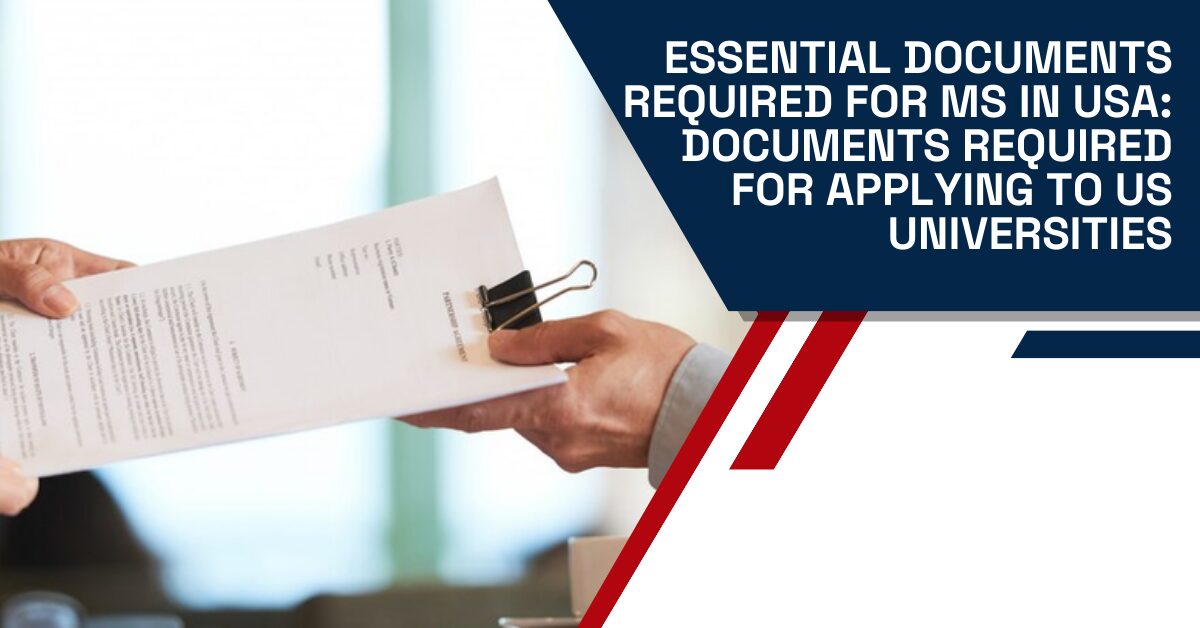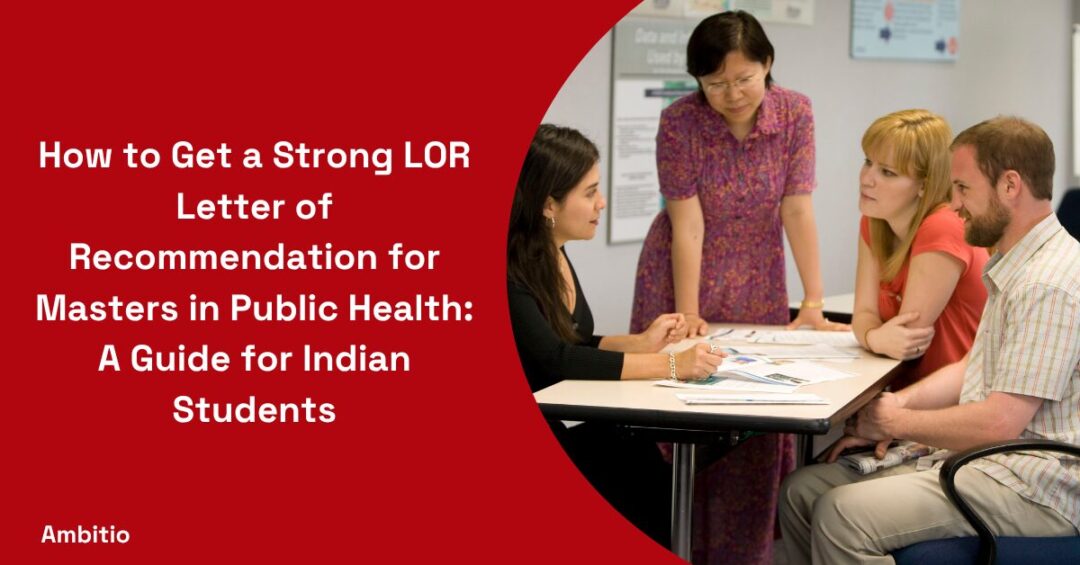17 December 2024
8 minutes read
Essential Documents Required for MS in USA: Documents Required For Applying to US Universities

Key Takeaways:
- Early preparation and organization are your best allies in navigating the complex document requirements for MS applications in the USA.
- Tailor your application materials to each university, showcasing how your unique experiences align with their specific programs.
- Don’t underestimate the power of a strong academic record, competitive test scores, and well-crafted personal statements in making your application stand out.
- Remember, the goal isn’t just admission; it’s finding the right fit for your academic journey, so research thoroughly and apply strategically.
Are you dreaming of pursuing your Master’s degree in the United States but feeling overwhelmed by the application process? Navigating the maze of required documents can be daunting, leaving many aspiring students confused and stressed. From transcripts to test scores, the sheer volume of paperwork can make even the most organized applicant’s head spin.
But don’t let document anxiety hold you back from getting admission into top American universities. This comprehensive guide to essential documents required for MS in USA is here to simplify the journey. We’ve broken down the requirements into clear, manageable steps, ensuring you have everything you need to submit a strong, complete application. Let’s demystify the process and set you on the path to success.
Documents Required for Applying to UG Courses

When applying to a bachelor’s programs in the USA, universities require a specific set of documents to evaluate your academic background and potential. Requirements may vary between institutions, but there’s a core list of materials you’ll need. Here’s a list of documents most universities require for UG admissions:
- High School Transcripts: Your academic records from grades 9-12.
- Standardized Test Scores: SAT or ACT scores, as universities may have different preferences.
- English Proficiency Test Scores: TOEFL, IELTS, or Duolingo scores for non-native English speakers.
- Letters of Recommendation: Usually two or three, from teachers or counselors.
- Statement of Purpose (SOP): An essay explaining your goals and why you’re applying.
- Resume/CV: A summary of your extracurricular activities, achievements, and work experience (if any).
- Passport: A valid passport for international student verification.
Remember, some universities may ask for additional materials like portfolios for arts programs or interviews. Always check each university’s specific requirements to ensure you’re fully prepared.
Documents Required for Applying to PG Courses
Applying for postgraduate programs in the USA requires a slightly different set of documents compared to undergraduate applications. These documents showcase your academic achievements, research potential, and professional experience. Here’s what you’ll typically need:
- Bachelor’s degree transcripts: Official records of your undergraduate studies. You can use a GPA calculator for MS to have an idea of your accurate score.
- GRE or GMAT scores: Depending on your program (GRE for most, GMAT for business).
- English proficiency scores: TOEFL, IELTS, or sometimes PTE. Know everything about IELTS score for MS in USA before you take the test.
- Letters of recommendation: Often from professors or employers, highlighting your capabilities.
- Statement of Purpose (SOP): A more detailed essay on your research interests and career goals.
- Resume/CV: Emphasizing relevant work experience, internships, and academic achievements.
- Research proposal or writing sample: For some programs, especially in humanities or sciences.
- Financial documents: Proof that you can support your studies (bank statements, scholarship letters).
- Passport and visa documents: For international student verification.
Some programs may have additional requirements like portfolios (for arts/design) or interviews. Always check the specific requirements for each university and program you’re applying to.
List of Important Documents for MS in USA
Applying for a Master’s degree in the USA requires a comprehensive set of documents that showcase your academic background, research potential, and personal qualities. Here’s an expanded list of essential paperwork most universities require for MS programs:
Passport
Your passport is your primary identification document. Ensure it’s valid for at least six months beyond your planned return date from the US. Make several copies of the first and last pages, as you’ll need these for various application processes.
Transcripts
These are official records from your undergraduate institution detailing all courses taken and grades received. Most US universities require sealed, official transcripts sent directly from your previous institution. Request multiple copies, as you’ll need to send one to each university you apply to.
Degree certificates
Your bachelor’s degree certificate or provisional degree certificate proves you’ve completed your undergraduate studies. If you’re in your final year, you might need to provide an expected graduation date and follow up with the certificate once available.
GRE scores
The Graduate Record Examination (GRE) tests your readiness for graduate-level work. Scores are usually valid for five years. Most programs require only the General Test, but some might ask for Subject Tests. Use the ETS service to send your scores directly to your chosen universities. Make it clear whether you need a SAT to study in USA before you apply.
English proficiency test scores
Tests like TOEFL, IELTS, or PTE Academic demonstrate your ability to understand and use English in an academic setting. Like GRE scores, these should be sent directly to universities. Check each program’s minimum score requirements.
Letters of recommendation (LORs)
These letters, usually from professors or employers, speak to your academic abilities, work ethic, and potential for success in graduate school. Most programs require three letters. Ensure your recommenders are aware of deadlines and provide them with addressed, stamped envelopes if needed.
Statement of Purpose (SOP)
This essay is your chance to convey your motivations, research interests, and career goals. It should also explain why you’re interested in the specific program and how your background prepares you for it. Tailor each SOP to the program you’re applying to.
Resume/CV
Your curriculum vitae summarizes your educational background, work experience, research, publications, honors, and relevant skills. Keep it concise (usually 1-2 pages for MS applications) and well-organized. Highlight achievements relevant to your chosen field of study.
Financial documents
These prove you can cover tuition and living expenses. This might include bank statements, scholarship award letters, or affidavits of support from sponsors. Be prepared to show funds for at least the first year of study. Remember, you don’t need to disclose loan applications to universities.
Application form
Each university has its own application, usually online. Fill it out accurately and completely. Double-check all information before submitting, as errors can delay your application.
Application fee
Understand the difference between public and private universities in the USA before you start the shortlisting process. Most universities charge a non-refundable application fee. Keep proof of payment, as you might need to submit this with other documents.
Work experience letters
If you’ve worked or interned, letters from your employers can strengthen your application. These should verify your role, duration of employment, and speak to your performance.
Certificates for extracurricular activities
Awards, participation certificates in competitions, conferences, or workshops, proof of volunteer work, or copies of published papers demonstrate your well-roundedness and can set you apart from other applicants.
Research proposals or portfolios
For research-intensive programs, you might need to submit a brief proposal outlining your research interests. For arts, design, or architecture programs, a portfolio showcasing your best work is often required.
Marksheets
These are the detailed grade reports for each year or semester of your undergraduate studies. For Indian students, 10th and 12th standard marksheets are also important. Have multiple attested copies ready.
Application confirmation copy
After submitting your online application, you’ll receive a confirmation email or page. Print this out and keep it safe. Some universities might require you to send a copy along with your other documents.
Remember, requirements can vary significantly between universities and even between different programs within the same university. Always refer to the specific requirements listed by each program you’re applying to. Start gathering these documents well in advance to avoid last-minute stress and potential delays in your application process.
How to Apply to US Universities?

Applying to US universities can seem like navigating a labyrinth, but with a clear understanding and a step-by-step guide, you can make your journey smooth and successful. There are many affordable masters degree for international students in the USA, but you have to start the search quite early. Start by researching universities and programs to find the best fit for your academic and career goals. Understand the timeline for applications, typically a year in advance, and note down all the crucial deadlines. Here’s a brief guide to help you get started:
Step 1: Research and shortlist universities and programs.
Step 2: Understand the specific requirements for each university.
Step 3: Prepare and gather all necessary documents.
Step 4: Take required standardized tests well in advance.
Step 5: Complete and submit your application before the deadline.
Step 6: Follow up with universities for confirmation and next steps.
Popular Universities to Study in the USA
The United States is home to some of the world’s most prestigious universities, offering a wide range of programs for international students. While the “best” university depends on your specific field of study and personal preferences, here are some consistently top-ranked institutions known for their excellent MS programs:
| University Name | Rank | Notable Programs | Tuition Fee Range | Student-to-Faculty Ratio | Noteworthy Features |
|---|---|---|---|---|---|
| Harvard University | #1 | Business, Law, Medicine | $50,000 – $60,000 | 8:1 | Prestigious Ivy League institution, with a strong global reputation |
| Massachusetts Institute of Technology (MIT) | #2 | Engineering, Computer Science | $50,000 – $60,000 | 3:1 | Renowned for cutting-edge research and innovation |
| Stanford University | #3 | Computer Science, Business | $55,000 – $65,000 | 5:1 | Located in Silicon Valley, strong connections to tech industry |
| University of California, Berkeley | #10 | Engineering, Economics | $40,000 – $50,000 | 20:1 | Located in Silicon Valley, strong connections to the tech industry |
| Columbia University | #5 | Journalism, International Relations | $55,000 – $65,000 | 6:1 | Ivy League, strong emphasis on global perspectives |
Choosing the right university is crucial for your academic and career success. Consider factors like the university’s reputation, program offerings, faculty expertise, campus culture, and alumni success. Here’s a more detailed guide on how to make an informed decision:
Research Thoroughly
Utilize a variety of sources to gather comprehensive information about potential universities. Here’s a checklist to guide your research:
- University Websites: Start with official university websites to get accurate and up-to-date information.
- Rankings: Look at various rankings like U.S. News, QS, and Times Higher Education for a general idea of university standing.
- Student Reviews: Websites like Niche and StudentsReview offer insights from current and former students.
- Forums and Social Media: Online forums and social media groups can provide unfiltered opinions and experiences.
Understand Program Specifics
Delve deeper into the specifics of the programs you’re interested in to ensure they align with your academic and career goals.
- Curriculum: Understand the structure, required courses, and electives offered.
- Faculty: Research the faculty’s expertise, publications, and projects to gauge the quality of instruction and mentorship you can expect.
- Resources and Facilities: Consider libraries, labs, study spaces, and technology available to students.
- Accreditation: Ensure the program and the university are accredited by recognized agencies.
Visit Campuses
If possible, visiting campuses can provide valuable insights and help you gauge the environment you’ll be spending years in.
- Campus Tours: Many universities offer guided tours where you can see facilities, meet current students, and ask questions.
- Open Days: Attend open days or fairs where you can gather information about different departments and services like housing, financial aid, and student support. Choose top universities that offer scholarship for students in the USA.
- Class Sit-ins: Some universities allow prospective students to attend a class or two. This can give you a real taste of the academic environment.
Preparing for Success: Tips and Strategies

Getting into colleges in the USA can be competitive, but with the right preparation, you can significantly improve your chances. Many universities offer excellent graduate programs, and understanding their requirements is key. Here are some strategies to help you successfully navigate the application process:
- Begin your preparation at least a year in advance.
- Explore programs at different universities that align with your goals.
- Maintain a strong academic record; universities prioritize this.
- Prepare well for GRE and English proficiency exams.
- Seek internships, research opportunities, or work in your field.
- Tailor it to each program, showcasing why you’re a great fit.
- Select professors or supervisors who know you well.
- This increases your chances to study in the USA.
- Keep track of application timelines for each university.
- Look into scholarships, assistantships, and grants many universities offer.
Remember, while rankings matter, focus on finding programs that best match your interests and career aspirations. Universities offer a wide range of specialized courses that might be perfect for you, even if they’re not the highest-ranked overall.
Conclusion
Applying to US universities is a significant step toward your academic and career aspirations. Reflect on the importance of thorough preparation, stay motivated and focused, and remember that this journey is not just about getting into a university but about shaping your future. With careful planning and a positive attitude, you’re on your way to achieving your dreams.
Dive into the future with confidence by crafting your ideal shortlist using Ambitio’s Shortlist Builder. This tool is your key to narrowing down your options, whether you’re selecting courses, colleges, or career paths, ensuring that your choices align with your ultimate ambitions and goals.
FAQs
How many copies of my transcripts are necessary for university applications?
Typically, universities require one official copy per application. However, it’s prudent to have 2-3 additional copies on hand
Can I apply for financial aid or scholarships as an international student?
Yes, many universities offer financial aid, scholarships, and assistantships to international students. Research options early, prepare strong applications, and be mindful of separate deadlines for funding opportunities.
What constitutes adequate proof of funds, and what amount is typically necessary?
Show enough funds to cover at least one year of tuition plus living expenses.
Provide bank statements, scholarship letters, or sponsorship letters.
Some universities have specific forms to be filled out.
How can I tailor my documents to meet the unique requirements of each university?
Review each university’s guidelines thoroughly.
Note any specific format, additional documents, or submission preferences.
Double-check everything before submission.
How can I verify my English proficiency, and are there exemptions?
Standard tests like TOEFL, IELTS, or Duolingo English Test are commonly accepted.
Some universities may exempt you if you’ve completed education in English or are from an English-speaking country.
How important are GRE scores and English proficiency tests for MS admissions?
Very important. Most US universities require these scores to evaluate your readiness for graduate-level work. Aim for competitive scores, but remember that admissions decisions consider your entire application holistically.

You can study at top universities worldwide!
Get expert tips and tricks to get into top universities with a free expert session.
Book Your Free 30-Minute Session Now! Book a call now




























